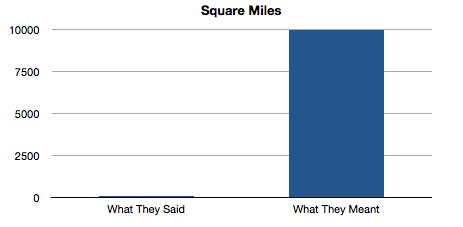A [correction](http://www.latimes.com/news/custom/corrections/) in yesterday’s LA Times:
> **Solar power:** A Friday editorial said that according to the U.S. Energy Department, enough sunlight hits a “100-square-mile” portion of the Nevada desert to power the entire country. It should have said “100-miles-square.”
Rearranging two words shouldn’t matter, should it?

Poor copy editing, sure. More than that, it’s bad language design: “square” and “miles” are alternately (and ambiguously) noun and modifier depending on word order. And the hyphens which transform it into an adjective only make it worse.
I’d argue that “square miles” and “square kilometers” really have no place in popular journalism, because we have little connection to what they mean.
 As humans, we never travel a “square mile.” We travel a mile. Or ten miles. If we’re thinking about an area of land, we’re probably mentally walking along two of its edges — which is what the LA Times and the U.S. Department of Energy were doing.
As humans, we never travel a “square mile.” We travel a mile. Or ten miles. If we’re thinking about an area of land, we’re probably mentally walking along two of its edges — which is what the LA Times and the U.S. Department of Energy were doing.
A better version would offer something of a roughly equivalent scale:
“According to the U.S. Energy Department, enough sunlight hits a 100-miles-square portion of the Nevada desert (roughly the area of Vermont) to power the entire country.”